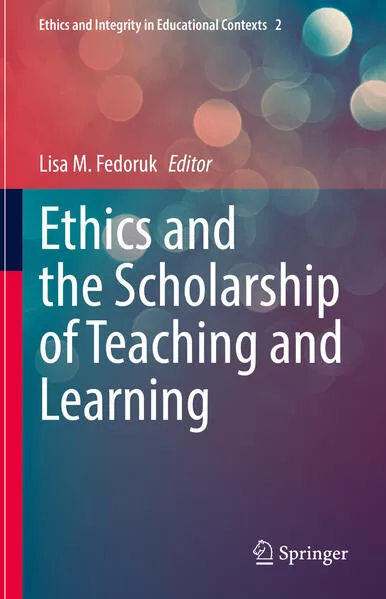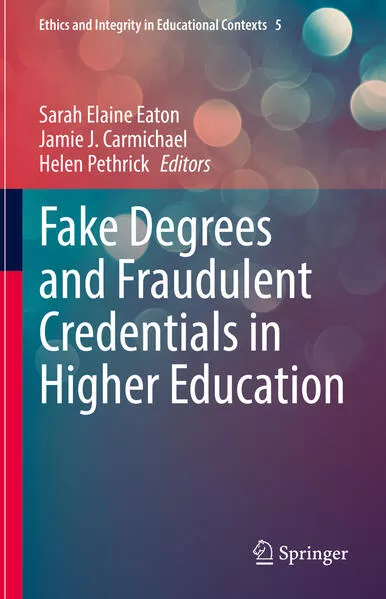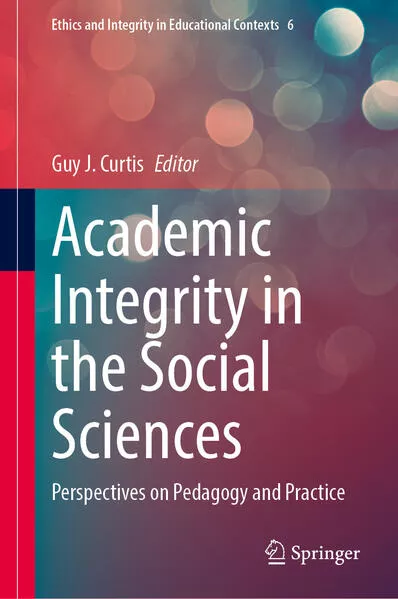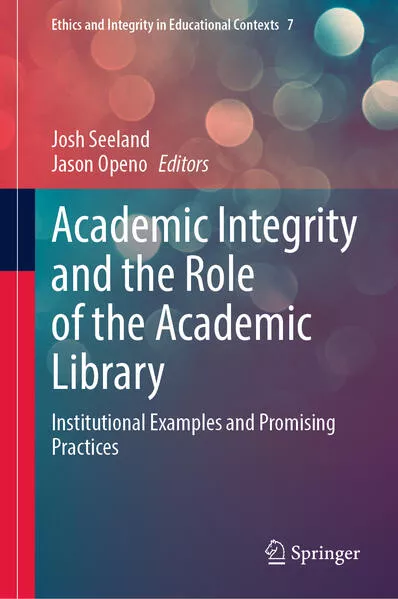Ethics and Integrity in Educational Contexts
Ethics and the Scholarship of Teaching and Learning
Chronologie aller Bände (1 - 4)
Die Reihenfolge beginnt mit dem Buch "Ethics and the Scholarship of Teaching and Learning". Wer alle Bücher der Reihe nach lesen möchte, sollte mit diesem Band von Lisa M. Fedoruk beginnen. Der zweite Teil der Reihe "Ethics and the Scholarship of Teaching and Learning" ist am 09.09.2023 erschienen. Mit insgesamt 4 Bänden wurde die Reihe über einen Zeitraum von ungefähr 2 Jahren fortgesetzt. Der neueste Band trägt den Titel "Academic Integrity in the Social Sciences".
- Anzahl der Bewertungen für die gesamte Reihe: 0
- Ø Bewertung der Reihe: 0
- Start der Reihe: 08.09.2022
- Neueste Folge: 20.10.2024
Diese Reihenfolge enthält 4 unterschiedliche Autoren.
- Autor: Fedoruk, Lisa M.
- Anzahl Bewertungen: 0
- Ø Bewertung:
- Medium: Buch
- Veröffentlicht: 08.09.2022
- Genre: Politik
Ethics and the Scholarship of Teaching and Learning
This book addresses issues related to ethics and the scholarship of teaching and learning, and pays special attention to ethical concerns and experiences that have arisen from engaging in Scholarship of Teaching and Learning (SoTL) work. The book draws on a range of research projects, theoretical frameworks and narrative experiences to provide multiple perspectives of how meaning is made of research ethics in SoTL, academic community and REB partnerships, experiences of Students as Partners in SoTL, and ethically-minded approaches to teaching, learning and inquiry. Specifically, this edited book includes ethical practices that have become increasingly expansive in an ever-evolving academic environment such as navigating pandemic pedagogy and data ownership due to increased online content. In addition, contributions pertaining to academic community partnerships between REBs and faculty detail realistic narratives and lessons learned about how higher education can become more equitable, diverse and inclusive. Subsequently, decolonial ethics for teaching and learning in higher education, as well as participatory parity, exemplify the need for SoTL practitioners to be responsive to the social and cultural realities of a global context in ways that address social inequities and social responsibility. Relational ethics by way of student perspectives on vulnerability and classroom-based SoTL research underscore the need for students to be taught about their own agency as a means of providing student voice within SoTL work. Lastly, this book celebrates how ethically-minded approaches to teaching, learning and inquiry uncover strategies and pedagogy that encourage concepts such as ethical imagination and systems and design thinking practices.
- Autor: Eaton, Sarah Elaine
- Anzahl Bewertungen: 0
- Ø Bewertung:
- Medium: Buch
- Veröffentlicht: 11.01.2023
- Genre: Politik
Fake Degrees and Fraudulent Credentials in Higher Education
The book also discusses how technology is being used to stop the proliferation of fake and fraudulent credentials in a variety of ways, including blockchain technology.
- Autor: Curtis, Guy J.
- Anzahl Bewertungen: 0
- Ø Bewertung:
- Medium: Buch
- Veröffentlicht: 17.11.2023
- Genre: Politik
Academic Integrity in the Social Sciences
This international book provides a series of viewpoints on academic integrity from the perspective of social sciences. It brings together multiple aspects of academic integrity, but with the consistent theme of being at a level of analysis that considers people and their place in the world. It covers topics such as how academic integrity can be taught, and why academic integrity breaches occur.
This book informs the work of researchers, educators, and practitioners as we go forward in understanding academic integrity and addressing academic misconduct. The social sciences include academic disciplines such as sociology, economics, psychology, education, anthropology, political science, and criminology. Researchers and theorists in these fields offer a range of unique and valuable perspectives on academic integrity with questions ranging from: “Why do students cheat and how best do we teach them not to?” to “What are the societal and political implications of academic cheating?”
- Autor: Seeland, Josh / Openo, Jason
- Anzahl Bewertungen: 0
- Ø Bewertung:
- Medium: Buch
- Veröffentlicht: 13.09.2024
- Genre: Politik
Academic Integrity and the Role of the Academic Library
This book presents the growing interconnection of two pillars from the world’s higher education institutions: academic integrity and libraries. It provides sound examples to extant questions and conversations about whose job it is to teach academic integrity, and what library work is. The role of libraries in supporting academic integrity is not always clear and has not been fully explored.
Drawing from library literature and that of academic integrity more broadly, readers are exposed to how libraries are necessary in a holistic approach to academic integrity. Education about academic integrity and the prevention of academic misconduct, for not only students but other institutional stakeholders, are demonstrated as occurring optimally in positive, supportive, and proactive ways. The book details numerous ways in which librarians can work with faculty and other stakeholders using established frameworks such as information literacy and blended librarianship as well as innovative platforms and content.
Other contributions involve the identification of potential academic misconduct and administration of academic integrity policies to complete the cycle recommended by the frameworks of global educational quality organizations (QAA, TEQSA). Initiatives presented in the book include those at the course level and institution-wide initiatives involving curriculum, policy, and supports for faculty and students. Also contained are efforts occurring at a national level within professional networks , in addition to international library curriculum. This book provides inspiration to institutions and academic libraries of any size and scope to embrace this emerging role in creating cultures of academic integrity.



